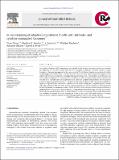In vivo targeting of adoptively transferred T-cells with antibody- and cytokine-conjugated liposomes
Author(s)
Zheng, Yiran; Stephan, Matthias T.; Gai, S. Annie; Abraham, Wuhbet; Shearer, Adrianne; Zheng, Yiran; Irvine, Darrell J; ... Show more Show less
DownloadZheng-2013-In vivo targeting of.pdf (1.538Mb)
PUBLISHER_CC
Publisher with Creative Commons License
Creative Commons Attribution
Terms of use
Metadata
Show full item recordAbstract
In adoptive cell therapy (ACT), autologous tumor-specific T-cells isolated from cancer patients are activated and expanded ex vivo, then infused back into the individual to eliminate metastatic tumors. A major limitation of this promising approach is the rapid loss of ACT T-cell effector function in vivo due to the highly immunosuppressive environment in tumors. Protection of T-cells from immunosuppressive signals can be achieved by systemic administration of supporting adjuvant drugs such as interleukins, chemotherapy, and other immunomodulators, but these adjuvant treatments are often accompanied by serious toxicities and may still fail to optimally stimulate lymphocytes in all tumor and lymphoid compartments. Here we propose a novel strategy to repeatedly stimulate or track ACT T-cells, using cytokines or ACT-cell-specific antibodies as ligands to target PEGylated liposomes to transferred T-cells in vivo. Using F(ab′)[subscript 2] fragments against a unique cell surface antigen on ACT cells (Thy1.1) or an engineered interleukin-2 (IL-2) molecule on an Fc framework as targeting ligands, we demonstrate that > 95% of ACT cells can be conjugated with liposomes following a single injection in vivo. Further, we show that IL-2-conjugated liposomes both target ACT cells and are capable of inducing repeated waves of ACT T-cell proliferation in tumor-bearing mice. These results demonstrate the feasibility of repeated functional targeting of T-cells in vivo, which will enable delivery of imaging contrast agents, immunomodulators, or chemotherapy agents in adoptive cell therapy regimens.
Date issued
2013-06Department
Massachusetts Institute of Technology. Department of Biological Engineering; Massachusetts Institute of Technology. Department of Chemical Engineering; Massachusetts Institute of Technology. Department of Materials Science and Engineering; Ragon Institute of MGH, MIT and Harvard; Koch Institute for Integrative Cancer Research at MITJournal
Journal of Controlled Release
Publisher
Elsevier
Citation
Zheng, Yiran, Matthias T. Stephan, S. Annie Gai, Wuhbet Abraham, Adrianne Shearer, and Darrell J. Irvine. “In Vivo Targeting of Adoptively Transferred T-Cells with Antibody- and Cytokine-Conjugated Liposomes.” Journal of Controlled Release 172, no. 2 (December 2013): 426–435.
Version: Final published version
ISSN
01683659